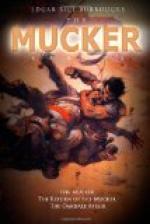As the weeks dragged along, and Billy Byrne found no friendly interest in himself or his desire to live on the square, and no belief in his protestations that he had had naught to do with the killing of Schneider he began to have his doubts as to the wisdom of his act.
He also commenced to entertain some of his former opinions of the police, and of the law of which they are supposed to be the guardians. A cell-mate told him that the papers had scored the department heavily for their failure to apprehend the murderer of the inoffensive old Schneider, and that public opinion had been so aroused that a general police shakeup had followed.
The result was that the police were keen to fasten the guilt upon someone—they did not care whom, so long as it was someone who was in their custody.
“You may not o’ done it,” ventured the cell-mate; “but they’ll send you up for it, if they can’t hang you. They’re goin’ to try to get the death sentence. They hain’t got no love for you, Byrne. You caused ’em a lot o’ throuble in your day an’ they haven’t forgot it. I’d hate to be in your boots.”
Billy Byrne shrugged. Where were his dreams of justice? They seemed to have faded back into the old distrust and hatred. He shook himself and conjured in his mind the vision of a beautiful girl who had believed in him and trusted him— who had inculcated within him a love for all that was finest and best in true manhood, for the very things that he had most hated all the years of his life before she had come into his existence to alter it and him.
And then Billy would believe again—believe that in the end justice would triumph and that it would all come out right, just the way he had pictured it.
With the coming of the last day of the trial Billy found it more and more difficult to adhere to his regard for law, order, and justice. The prosecution had shown conclusively that Billy was a hard customer. The police had brought witnesses who did not hesitate to perjure themselves in their testimony— testimony which it seemed to Billy the densest of jurymen could plainly see had been framed up and learned by rote until it was letter-perfect.
These witnesses could recall with startling accuracy every detail that had occurred between seventeen minutes after eight and twenty-one minutes past nine on the night of September 23 over a year before; but where they had been and what they had done ten minutes earlier or ten minutes later, or where they were at nine o’clock in the evening last Friday they couldn’t for the lives of them remember.
And Billy was practically without witnesses.
The result was a foregone conclusion. Even Billy had to admit it, and when the prosecuting attorney demanded the death penalty the prisoner had an uncanny sensation as of the tightening of a hempen rope about his neck.




